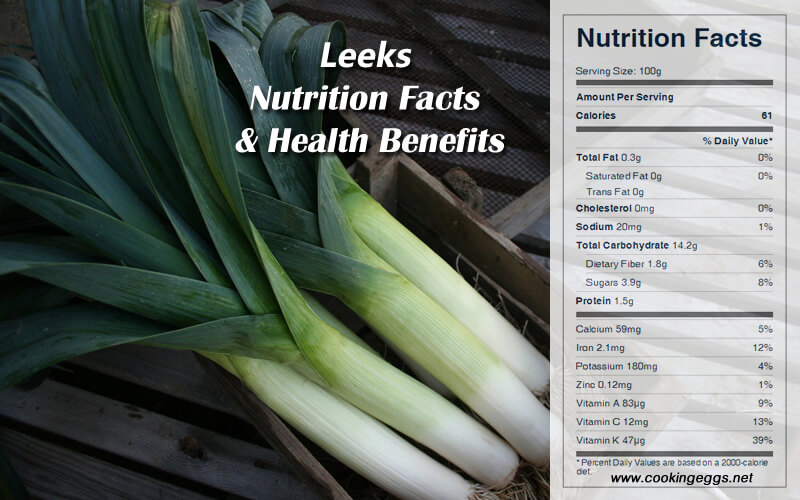Leeks Nutrition Facts & Health Benefits
Leeks have been cultivated in the West for at least 4,000 years. Members of the same healing family as onions and garlic, they have the same properties. Here are the nutritional benefits of leeks.
Raw leek is 83% water, 14% carbohydrates, 1% protein, and contains negligible fat. Leek is a rich source of vitamin K and manganese. It is a moderate source of vitamin B6, folate, vitamin C, and iron.

One-half cup of cooked chopped leeks provides 16 calories, 4 g carbohydrate, 0.4 g protein, 0.2 g fat, 0.6 g dietary fiber, 25 IU vitamin A, 2 mg vitamin C, 12 mcg folic acid, 46 mg potassium, 6 mg sodium, 8 mg phosphorus, 16 mg calcium, and 8 mg magnesium.
Raw Leek Nutrition Facts Label
Health Benefits of Leeks
Leeks are popular in traditional European foods. The ancient Egyptians, the ancient Greeks, and the Romans all prized them for their medicinal value. This was because these plants, close relatives of onions and garlic, could be left in the ground during the winter and harvested as needed, providing a rare source of fresh winter produce.
The leek is a vegetable, a cultivar of Allium ampeloprasum, the broadleaf wild leek. Leeks have a mild, onion-like taste. In its raw state, the vegetable is crunchy and firm. The edible portions of the leek are the white base of the leaves (above the roots and stem base), the light green parts, and to a lesser extent, the dark green parts of the leaves. The dark green portion is usually discarded because it has a tough texture, but it can be sautéed, or more commonly, added to stock for flavor.
The Allium family, to which leeks, garlic, and onions belong, has long been recognized for their cardiovascular benefits. Allicin, the compound that gives these vegetables their characteristic aromas, has antibacterial and anti-fungal properties, is an anti-inflammatory, and may help reduce fat deposits and hardening in blood vessels.
Allicin breaks down into components that appear to be strong antioxidants. A diet rich in alliums tends to lower both blood pressure and low-density lipoprotein (bad cholesterol), reducing the risk of heart disease and stroke.
Leeks are a very good source of manganese and a good source of vitamin B6, folate, vitamin C, and iron. This combination of nutrients helps stabilize blood sugar by slowing the absorption of sugars in the digestive tract and assisting in proper sugar metabolism.
In French traditional medicine, they are prescribed for respiratory problems, and being rich in potassium, they are also valued for their cleansing and diuretic powers. Their ability to eliminate uric acid means that people with gout or arthritis should eat plenty of leeks.
Health Risk
Leeks are among the vegetables that contain measurable amounts of oxalates, which can cause problems for people with kidney disease, gout, rheumatoid arthritis, vulvar pain, or other conditions requiring a low-oxalate diet.